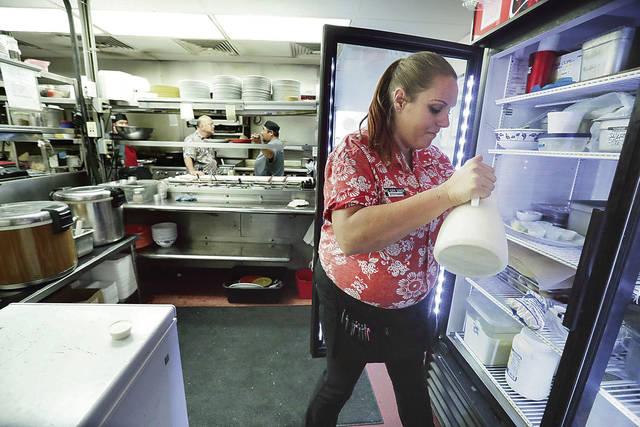Organizers seek to extend homeless job training program

CINDY ELLEN RUSSELL / CRUSSELL@STARADVERTISER.COM
Stephanie Burge, 34, has gotten a job as a waitress at Big City Diner by participating in a job training program.
Stephanie Burge had not had a job, let alone a job interview, in six years and had been living in one of America’s biggest homeless encampments along with more than 300 people near Kakaako Waterfront Park.
Burge, 32, is now off the street and living nearby in Waikiki Health’s Next Step Shelter, where she joined the job training program, made a critical connection at the shelter’s monthly job fairs and got some encouragement and confidence from presentation guru Pam Chambers.
Now Burge works nearly full time at Big City Diner’s Kaimuki restaurant as a server.
And on Wednesday she has an interview scheduled with a landlord to see if she can move into her first permanent home in six years: a studio apartment on Beretania Street that rents for $800 a month, plus utilities.
Asked whether she can afford the rent — along with her fiance, who also works and lives at Next Step — Burge said, “I’m making tips, baby! All you have to do is want it. Ask and you shall receive.”
Burge may be the superstar of two groups of Next Step Shelter clients that Chambers has coached since January.
Don't miss out on what's happening!
Stay in touch with breaking news, as it happens, conveniently in your email inbox. It's FREE!
Out of 14 people who have attended Chambers’ five-week sessions inside the cavernous shelter, only three are still looking for jobs. Two who did find work have since gotten permanent homes and moved out of Next Step.
Chambers, founder of Pam Chambers Consulting, has written books on public speaking, body language and presentation. She has worked with attorneys, entertainers and CEOs.
But Chambers did not know what to expect when Waikiki Health officials approached her about coaching job seekers who had been homeless and were living at Next Step.
“At first I thought, ‘I don’t know if I’m going to be able to relate well with these people,’” Chambers said. “They were exactly like any group of people I’ve worked with. Some were nervous, some were funny. The only difference is that they were living in a shelter.”
The $4,000 grant for Chambers’ program came from a local organization called The Adams Family Foundation and has since run out.
But with the success of the original two classes, Waikiki Health wants to expand the program and is looking for a $12,000 annual grant to run four classes per year, including materials.
Chambers is willing.
“For me it’s being able to use my skills to be part of the homeless solution, to help that problem go away a tiny bit,” Chambers said.
While Chambers’ Next Step students were looking for tips on how to look and act for job interviews, Chambers’ primary goal was simple. “I want them to be able to walk into a room like they deserve to be there,” she said.
All of the students come from Next Step’s job training program and earn money doing basic chores.
“They’re already employed at the shelter,” Chambers said. “But the goal is to get them employed outside the shelter so they can actually find a rented room.”
The first highlight of the program comes in the third week, when a Waikiki Health van takes students on a $40 shopping spree at the Goodwill Industries store on Beretania Street to look for job interview clothes that Goodwill donates.
The students are expected to show up in their new clothes for graduation on the fifth week. So Chambers was surprised that all of the students broke out their new clothes a week earlier for mock job interviews before graduating from the program.
While some of the students were still nervous, the 11 employers who show up each month at Next Step’s job fairs know that each applicant had been homeless and was living in a shelter.
One of them was Burge’s future employer, Big City Diner.
“I love them,” Burge said. “I was given an opportunity. It was a big deal for me.”
She especially likes serving customers at the restaurant.
“It makes me happy,” Burge said. “I like to put a smile on somebody’s face.”
If Waikiki Health can find a donor, Chambers said she wants to conduct future classes in an office setting at Waikiki Health’s administrative offices in Moiliili.
“That shelter is not an ideal place,” Chambers said. “It’s very hot, very noisy with airplanes flying above and Re-use Hawaii right next door with their trucks.”
So Chambers wants to move the classes into “a nice professional environment.”
And the students will be expected to up their game and “dress professionally for each class,” Chambers said.
“We’re going to raise the bar for them,” she said.




